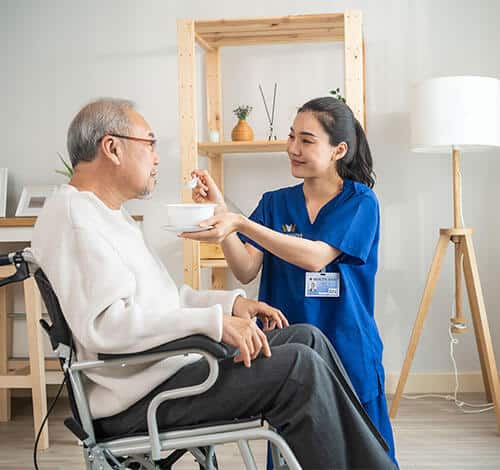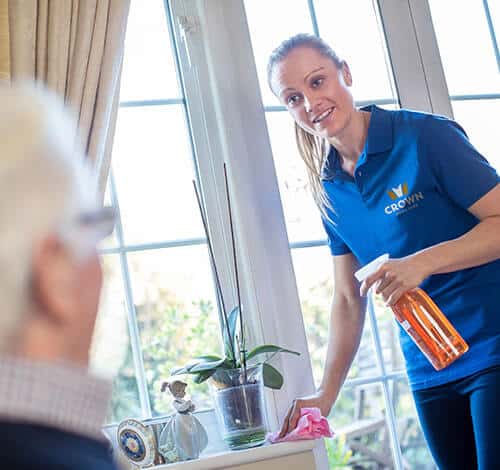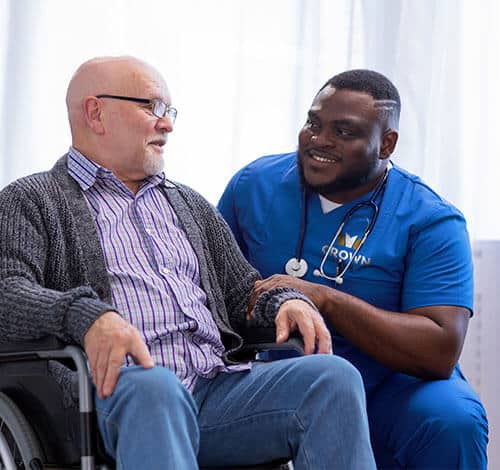The Nursing Home Transition/Diversion Waiver (NHTD) is a Medicaid program that helps people live on their own instead of in nursing homes or other big places. At Crown Home Care, we give personal planning, support services, and resources to help people be more independent, have a better life, and fit into their communities.
At Crown Home Care, our certified and caring aides are focused on giving important help and strong emotional support, making it easy for people to switch to living on their own. With their knowledge and real care, our team makes sure each person gets the special attention they need throughout their journey.

Moving from a nursing home to your own home or community helps you be more free, take part in society, and feel connected.
NHTD services care about you as an individual, giving you the support and services that fit your needs and choices, making your life better and helping you be more independent.
The NHTD program stops the need for long-term care in big places by giving you access to lots of services at home. You get guidance and support from a strong support network.

Our team makes sure people get personal help with daily activities and staying clean.
We help with getting groceries, making sure people can get and keep the things they need.
Our caregivers are there to be friends, creating a supportive and fun environment for people.
We plan activities to keep the mind active and promote good mental well-being.
We organize and support social activities, making connections within the community and reducing loneliness.
Our team makes sure people have good and balanced meals, thinking about dietary needs.
We make sure people take their medicines at the right time and in the right way.
We help with light cleaning tasks, keeping the home comfortable and safe.
We help people fit into their communities smoothly, making it easy to start living on their own.
Our caregivers are kind and understanding, offering ongoing emotional support so people feel safe and valued on their journey.
Our team makes sure people get personal help with daily activities and staying clean.
We help with getting groceries, making sure people can get and keep the things they need.
Our caregivers are there to be friends, creating a supportive and fun environment for people.
We plan activities to keep the mind active and promote good mental well-being.
We organize and support social activities, making connections within the community and reducing loneliness.
Our team makes sure people have good and balanced meals, thinking about dietary needs.
We make sure people take their medicines at the right time and in the right way.
We help with light cleaning tasks, keeping the home comfortable and safe.
We help people fit into their communities smoothly, making it easy to start living on their own.
Our caregivers are kind and understanding, offering ongoing emotional support so people feel safe and valued on their journey.

Traumatic Brain Injury (TBI) Home Care Services are made to help people manage and overcome difficulties and stress linked to their condition. More and more, people with TBI want care in their own comfortable places, but they often need help with daily activities because of physical limits.
That’s where our home care services for people with Traumatic Brain Injury come in. We play a big part in helping people recover, be independent, and feel better overall. Our skilled and caring caregivers are focused on providing daily physical help, emotional support, and making sure the home is safe and clean.

Support is given for light cleaning, laundry, and other tasks to keep the home comfy and safe.
Caregivers help people with TBI manage their medicines, making sure they take the right amount at the right times to stay healthy.
People with TBI might feel emotional challenges. Our caregivers are there to be friends, give emotional support, and do things that help people feel good.
Home Care Aides help with planning and making meals, thinking about what’s needed for a healthy diet.
Our aides help with everyday things like bathing, dressing, grooming, using the bathroom, and moving around, making sure life is easier for people with TBI.
Caregivers can go with people with TBI to medical appointments and other places, helping with important tasks.
Support is given for light cleaning, laundry, and other tasks to keep the home comfy and safe.
Caregivers help people with TBI manage their medicines, making sure they take the right amount at the right times to stay healthy.
People with TBI might feel emotional challenges. Our caregivers are there to be friends, give emotional support, and do things that help people feel good.
Home Care Aides help with planning and making meals, thinking about what’s needed for a healthy diet.
Our aides help with everyday things like bathing, dressing, grooming, using the bathroom, and moving around, making sure life is easier for people with TBI.
Caregivers can go with people with TBI to medical appointments and other places, helping with important tasks.